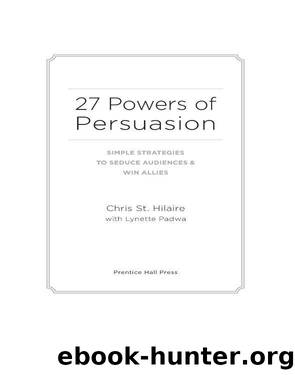27 Powers of Persuasion by Chris St. Hilaire

Author:Chris St. Hilaire
Language: eng
Format: epub
Publisher: Penguin Publishing Group
Published: 2010-06-28T00:00:00+00:00
POWER #13
Use Emotional Language
You donât sell newspapers by writing about an accident. You sell newspapers by writing about a tragic accident. Thatâs the power of emotional language. Emotional language creates a picture in peopleâs minds, and that helps them connect with your idea on a deeper level than if they just agree with the facts. Politicians and marketers are old hands at using vivid language to tell their story, and journalists do it even when theyâre supposedly presenting an objective report. If a journalist wants to jolt the public into caring about a case of misdiagnosis, he or she will write something like, âA fist-size blood clot was developing.â That factual yet gruesome description will grab readersâ attention much more than âa five-inch blood clot.â Good trial lawyers are skilled practitioners of emotional language tooâironic, since lawyers are also the folks who brought you legalese.
Using emotional language is a way to get your audience not only to understand your argument but also to feel it. A few years ago I was involved in a campaign for a bill to fund an extra lane for a local freeway, and the county wanted to run promotional ads for the bill promising to âimprove our roadsâ and âreduce commute time.â Folks might like the idea of that, but they wonât necessarily bother to leave the house to go vote for it. People donât care about traffic unless they are stuck in it and missing their childrenâs soccer practice. A better approach was to run ads asking, âWouldnât it be nice to get to your childâs practice on time for once?â or, âWouldnât you like to get home early enough to have dinner with your family every night?â That helped voters picture exactly how the expanded freeway would improve their lives.
Emotional language is specific. If I told you, âCloverdale Enterprises gave $10,000 to the community,â youâd probably think, âThatâs nice,â and if you pictured anything it would be $10,000 disappearing into the black hole of city government. But if I said, âCloverdale Enterprises handed out bottled water at the cityâs 10K, repaved the high schoolâs tennis courts, and sponsored a holiday food drive at the elementary school,â youâd instantly visualize the Cloverdale folks handing water bottles to thirsty runners, followed by images of tennis-playing high schoolers and cute third graders loading up food boxes. Those things together may not cost $10,000, but they paint a picture. Itâs personal, itâs specific, and itâs meaningful. Whenever you want to use emotional language, you need to ask yourself, âWhat is the most basic and specific way this issue can affect the average personâs everyday life?â
Using emotional language sometimes sparks the accusation that facts are being âspun.â But in every situation, each side has its version of the truth. Attorneys have an obligation to talk about the truth in a way that benefits their client. Likewise, anyone who hopes to persuade an audience has an obligation to explain his or her version of the situation in language the audience will understand, remember, and care about.
Download
This site does not store any files on its server. We only index and link to content provided by other sites. Please contact the content providers to delete copyright contents if any and email us, we'll remove relevant links or contents immediately.
Hit Refresh by Satya Nadella(9138)
The Compound Effect by Darren Hardy(8970)
Change Your Questions, Change Your Life by Marilee Adams(7783)
Nudge - Improving Decisions about Health, Wealth, and Happiness by Thaler Sunstein(7709)
The Black Swan by Nassim Nicholas Taleb(7133)
Deep Work by Cal Newport(7085)
Rich Dad Poor Dad by Robert T. Kiyosaki(6637)
Daring Greatly by Brene Brown(6514)
Principles: Life and Work by Ray Dalio(6454)
Playing to Win_ How Strategy Really Works by A.G. Lafley & Roger L. Martin(6313)
Man-made Catastrophes and Risk Information Concealment by Dmitry Chernov & Didier Sornette(6020)
Big Magic: Creative Living Beyond Fear by Elizabeth Gilbert(5775)
Digital Minimalism by Cal Newport;(5765)
The Myth of the Strong Leader by Archie Brown(5509)
The Slight Edge by Jeff Olson(5419)
Discipline Equals Freedom by Jocko Willink(5390)
The Motivation Myth by Jeff Haden(5213)
The Laws of Human Nature by Robert Greene(5209)
Stone's Rules by Roger Stone(5088)
